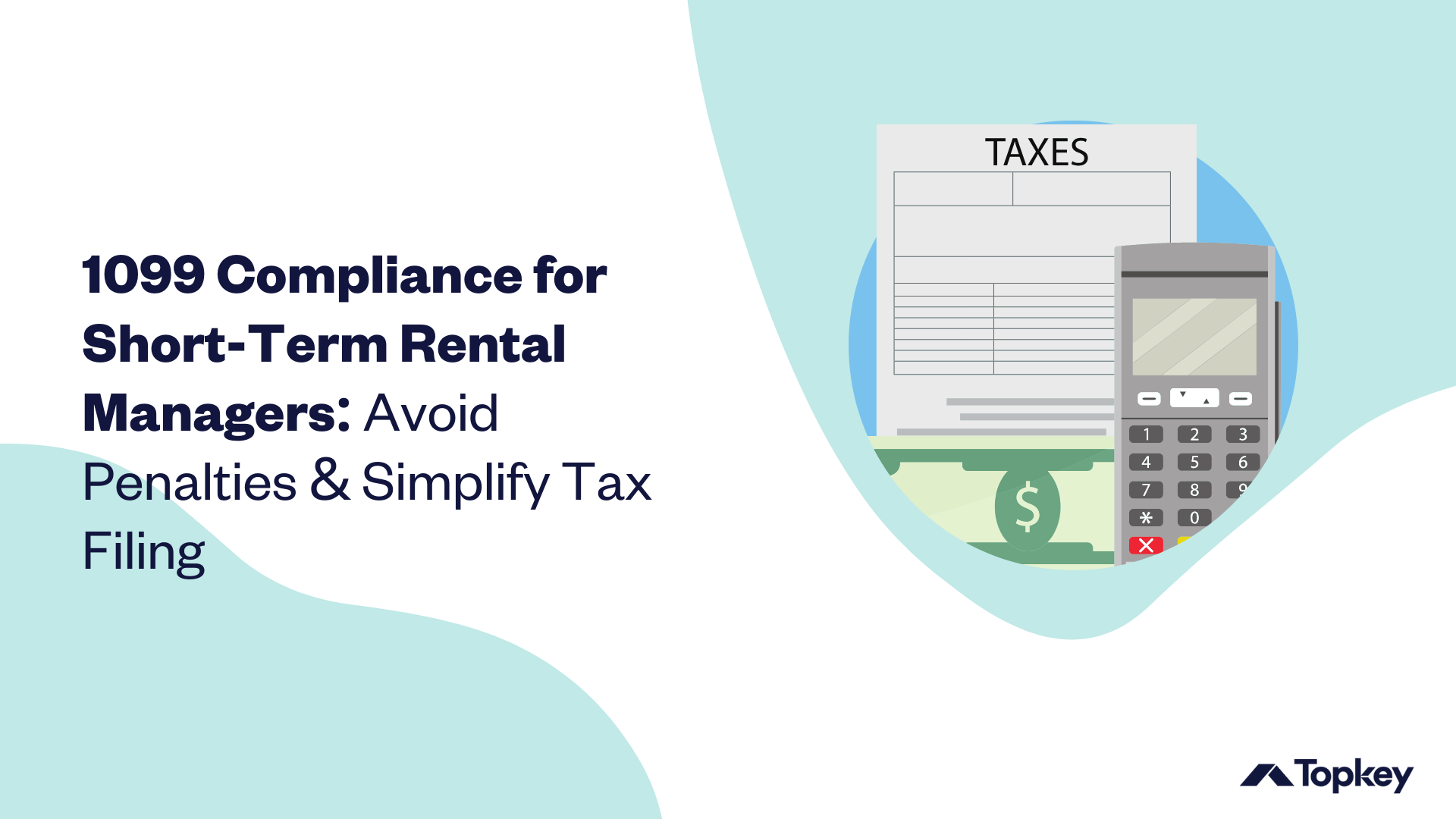1099 Compliance for Short-Term Rental Managers: Avoid Penalties & Simplify Tax Filing



**Disclaimer: The information provided in this article is for informational purposes only and should not be considered tax, legal, or financial advice. Topkey does not provide tax or legal services. You should consult with a qualified tax professional or attorney regarding your specific situation before making any financial or tax-related decisions.
As a short-term rental manager, you’re responsible for ensuring that all necessary tax documents are filed accurately and on time. One of the most critical components of tax compliance is issuing 1099 forms to your independent contractors and service providers. But with multiple vendors and ever-changing IRS rules, it’s easy to slip up and face penalties.
This comprehensive guide outlines everything you need to know to stay on top of 1099 compliance, from which forms apply to which vendors, to how you can automate the process and focus on what you do best—managing rentals and delighting guests.
1. Introduction
Every short-term rental operation relies on multiple vendors, from housekeeping staff to landscaping services. Failing to file 1099s correctly for these vendors can lead to IRS penalties, tax audits, and unnecessary financial stress. If you’re paying a contractor more than $600 in a calendar year, chances are you need to send them a 1099.
In this post, we’ll explain who needs a 1099, how to avoid common pitfalls, and why automating your tax filing can save you time and money.
2. Who Needs a 1099?
Understanding IRS Requirements
Any vendor, contractor, or service provider who receives $600 or more in non-employee compensation during the year must be issued a 1099-NEC. This typically applies to:
- Housekeepers
- Landscapers
- Maintenance professionals
- Photographers or marketing freelancers
- Guest service consultants
- Freelance accountants or bookkeepers
The 1099-MISC is used for rent, prizes, and legal fees, it used to be also used for non-employee compensation. Now, 1099-NEC is primarily for non-employee compensation. 1099-MISC still exists for other types of income. See: IRS Form 1099-MISC Instructions on the IRS website to review "Who Must File" and "What's New."
However, if you pay a vendor using a credit card or certain third-party processors like PayPal or Stripe, the payment processor is responsible for sending out a 1099-K (if they meet reporting thresholds). In other words, you don’t need to file a 1099 yourself in those cases.
Real-World Example
Let’s say you hire a freelance photographer to take updated listing photos throughout the year, and you pay them $700 via check or direct bank transfer. Because you’ve paid more than $600 and the payment method isn’t a third-party processor, you need to file a 1099-NEC for that photographer.
3. Common 1099 Mistakes (And How to Avoid Them)
1. Failing to Collect W-9 Forms in Advance
A W-9 form should be collected before you issue any payments. This form provides you with the contractor’s legal name, address, and taxpayer identification number (TIN) or Social Security number. Not having a valid W-9 is one of the main reasons for delays in filing and potential IRS penalties.
2. Misclassifying Contractors as Employees
If you’ve misclassified workers as contractors instead of employees, you risk serious consequences, including back taxes and penalties. Employees are reported on W-2 forms, while independent contractors receive 1099-NEC. Make sure you understand the IRS guidelines on determining whether a worker is truly independent or should be an employee.
3. Missing the IRS Filing Deadline
Key Deadlines:
- January 31st: Deadline for filing 1099-NEC with the IRS and providing copies to contractors.
- February 28th (paper filing) or March 31st (e-filing): Deadline for filing 1099-MISC.
If you miss these deadlines, you could face penalties of up to $280 per form. Keeping a clear schedule and marking your calendar can help you avoid these hefty fines.
It's crucial to check the IRS website for the specific deadlines for the current tax year as they can sometimes shift slightly. IRS Tax Calendar for Businesses and Self-Employed - This is the best place to find the most up-to-date deadlines for various business tax forms, including 1099s.
4. Step-by-Step Guide to 1099 Compliance
Step 1: Collect & Verify W-9s
Start collecting W-9s from every new contractor before you make your first payment. Double-check that the provided TIN or Social Security number is accurate. Any mismatch can lead to IRS rejections or added scrutiny.
Step 2: Track Payments Throughout the Year
Maintain detailed records of all payments to vendors. Many property managers use accounting software or spreadsheets to track expenses. Keep in mind that credit card or PayPal transactions aren’t your responsibility to report on a 1099 (the processor handles that).
Step 3: Verify & Prepare for Filing
Before submitting your 1099s, carefully cross-check vendor names, addresses, and amounts paid. Using automated compliance tools can significantly reduce the risk of data entry errors.
Step 4: File & Send 1099s
If you’re filing multiple 1099 forms, consider using the IRS FIRE (Filing Information Returns Electronically) system or an e-filing service. Once filed, don’t forget to send copies of each 1099 to your contractors by January 31st*. *The IRS typically requires this form to be filed by January 31st, but consult a tax professional to confirm your obligations.
5. How to Automate 1099 Compliance & Reduce Errors
The Problem with Manual Tax Filing
Doing everything by hand—collecting paper W-9s, manually entering payment data, and worrying about deadlines—is not only time-consuming but also prone to human error. A simple typo in a TIN or a missed payment can trigger IRS notices and even an audit.
How Topkey Simplifies 1099 Compliance
Without the right systems in place, preparing 1099s can become a multi-day project that involves:
- Manually reviewing an entire year's worth of transactions
- Tracking down vendor information that might be scattered across different systems
- Determining which payments qualify for 1099 reporting
- Ensuring you have accurate W-9 forms for all vendors
- Reconciling payment records across multiple accounts and payment methods
- Meeting strict IRS filing deadlines
Based on the financial operations challenges we've seen property managers face, a comprehensive financial platform can simplify 1099 preparation through:
Centralized Vendor Management
When vendor information is stored in one secure location, property managers can:
- Keep track of tax ID and business entity information
- Store contact information for tax document delivery
- Identify vendors who require 1099 reporting
Automated Payment Tracking
With automated expense tracking, property managers benefit from:
- Having all vendor payments captured in one system
- Payments properly tagged by vendor and property
- Easy review capabilities before 1099 generation
Simplified Tax Reporting
When tax season arrives, property managers with the right financial systems can:
- Review their vendor list with calculated payment totals
- Verify which vendors meet the $600 threshold for reporting
- Generate necessary tax forms more efficiently
6. 1099 Compliance Checklist for Property Managers
- Collect W-9 forms from all vendors before making payments.
- Confirm vendor payment methods (checks vs. credit card/PayPal).
- Track vendor payments throughout the year to identify who hits the $600 threshold.
- Ensure accurate TINs or Social Security numbers are on file.
- Prepare 1099s for any contractor who exceeds $600 in total annual payments.
- Verify all 1099 forms for accuracy—mistakes can lead to IRS penalties.
- Submit 1099-NEC by January 31st to both the IRS and contractors.*
- Stay organized and avoid late filings to dodge hefty fines.
- Leverage automation tools to centralize vendor information and speed up the filing process.
7. Data & Statistics for Credibility
- The IRS issues millions of penalties annually for errors and late filings of information returns like 1099s, highlighting the widespread nature of these compliance issues.
- Studies suggest a significant percentage of small businesses make tax reporting errors, which can lead to audits and penalties.
- Property managers using automation software have shown an 80% reduction in filing errors.
- IRS penalties for incorrect TINs can go up to $280 per form, which can quickly erode your cash flow.
8. Conclusion & Call-to-Action
1099 compliance can feel daunting, but it’s crucial to keep your property management business running smoothly and avoid costly IRS penalties. By understanding which forms you need and organizing your records, you can minimize errors and ensure a stress-free tax season.
Ready to simplify your financial operations? Schedule a free demo with Topkey today and see how our platform can help you effortlessly manage vendors, track payments, and more. Don’t let outdated manual processes hold you back—take control of your financial operations now!
Disclaimer: The information provided in this article is for informational purposes only and should not be considered tax, legal, or financial advice. Topkey does not provide tax or legal services. You should consult with a qualified tax professional or attorney regarding your specific situation before making any financial or tax-related decisions.
*The IRS typically requires this form to be filed by January 31st, but consult a tax professional to confirm your obligations.
____
Topkey is a financial technology company and is not a bank. Banking services provided by Thread Bank; Member FDIC. The Topkey Visa Debit & Charge Cards are issued by Thread Bank pursuant to a license from Visa U.S.A. Inc. and may be used everywhere Visa cards are accepted.







.png)



.png)


































